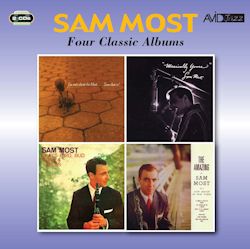 BUY NOW AmazonUK AmazonUS |
Four Classic Albums
|
CD1
1-10: ‘I’m Nuts About The Most... Sam That Is!’
1. Cherokee
2. Don’t Worry ‘Bout Me
3. What A Difference A Day Makes
4. How Deep Is The Ocean
5. Falling In Love With Love
6. Rose Room
7. Smiles
8. Broadway
9. Tea For Two
10. ‘Deed I Do
11-18: ‘Musically Yours’
11. Stella By Starlight
12. Hush-A-Bye
13. Obvious Conclusion
14. Autumn Leaves
15. If I Had You
16. Body And Soul
17. House Of Bread Blues
18. Two For Three
CD2
1-8: ‘Plays Bird, Bud, Monk & Miles’
1. Strictly Confidential
2. Half Nelson
3. ‘Round Midnight
4. In Walked Bud
5. Serpents Tooth
6. Celia
7. Confirmation
8. Bluebird
9-14: ‘The Amazing Mr Sam Most’
9. It Might As Well Be Spring
10. You Stepped Out Of A Dream
11. Softly As In A Morning Sunrise
12. Lover Man
13. Alone Together
14. When Your Lover Has GoneSam Most with accompanists
Recorded 1955-57
Avid has made strides to give its booklets a more appealing look than has sometimes been the case in the past, where straight reproductions of LP liner notes gave a chaotic appearance of notes and personnel details. Fortunately, the latter is now contained on the first two pages with the liner notes, all in the same font and size, on the following pages.
That’s good news for admirers of flautist and clarinetist Sam Most in these 1955-57 sessions. His Sextet session I’m nuts about the Most…Sam that is! (not the world’s best LP title, one feels) was arranged by Ronnie Woellmer and featured Most in a front line alongside baritone saxist Marty Flax. The ten standards are played with fluent virtuosity motored by the powerhouse rhythm sections – on some tracks Oscar Pettiford and Osie Johnson are on board whilst on others it’s Burgher Jones and Bobby Donaldson. Billy Triglia, who has listened to Teddy Wilson rather more than Bud Powell, is always on hand at the piano stool. Whether it’s Swing-infused-by-Bop, or Bop-laced-by-Swing doesn’t much matter. Most creates two voices by humming as he blows on a couple of tracks. Be careful with those personnel listings. Despite what it may say, Most plays clarinet, not flute, on several tracks including Rose Room, and it reminds one that it’s a real pity he didn’t carry on full-time with the instrument much beyond the last of these sessions. He had a distinctive voice on it, with hints of tartness in his blues-rich phrasing. He could have given Buddy DeFranco a real run for his money.
In the July 1956 album Musically Yours he leads a superb quartet of Bob Dorough, Bill Crow and Joe Morello. Dorough is a more modern stylist than Triglia and once again Most’s blow-and-hum predilection on flute can be heard here, notably on the beautiful song Hush-A-Bye. This excellent session also features crisp exchanges between Crow and Morello onIf I Had You and a funkily voiced, blues-deep House of Bread Blues.
Dorough returns as pianist and arranger in Sam Most plays Bird, Bud, Monk and Miles, a self-explanatory eight-track March 1957 album recorded either with a large 16-piece orchestra or a sextet. Playing clarinet here, he again reprises those distinctive, tradition-honouring qualities that were infused with contemporary ideas about harmony and metrics. There’s an especially fine ‘Round Midnight where the orchestral colours summon up a rather forlorn, Edward Hopper scene over the polyrhythms. The sextet features rich-toned trumpeter Doug Mettome, who takes strong solos and trades, tenor David Schildkraut, who can sound Websterish in places, Dorough, bassist Tommy Potter and Paul Motian (who was drummer for the orchestral tracks too). One of the standout moments comes in the angular sextet approach to In Walked Bud, where Schildkraut takes daringly protracted pauses. Whether in the sextet or with orchestra Most plays consistently well.
The final album is The Amazing Mr Sam Most. Teddy Charles arranged the string section and once again Most was blessed by another elite rhythm section: pianist Hall Overton, and then guitarist Jimmy Raney, bassist Addison Farmer and drummer Roy Haynes. Overton impresses – he’s a perky, frisky stylist – and there are impressionistic hues in the string arrangements. Most sounds at his most unleashed on a funkyLover Man but perhaps the most interesting track is When Your Lover Has Gone where he plays clarinet, with hints of Artie Shaw, over Farmer’s walking bass for well over two minutes before Teddy Charles finally unleashes the strings, and the clarinet can trade with the bass.
Well transferred, this is a decidedly good twofer.
Jonathan Woolf